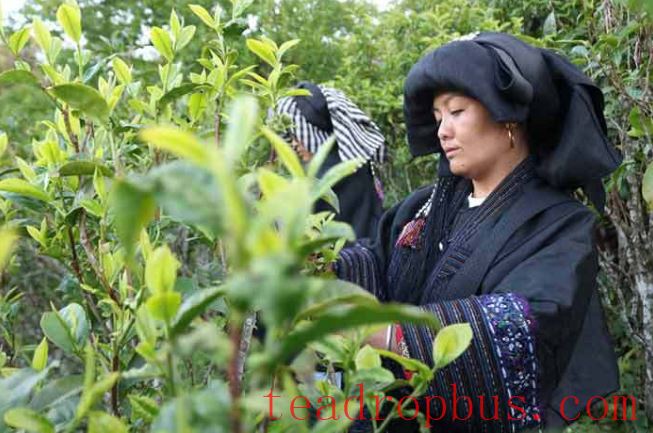As spring warms and flowers bloom, it is once again the season for the fragrant Spring Tea harvest. In Yongde County's Yalian Township, after a winter's accumulation, the Tea plants are rich in nutrients and are sprouting fresh new buds basking in the spring light, lush and bright green. With baskets slung at their waists and straw hats on their heads, tea farmers work in groups or move through the lush rows of tea plants, their fingers dancing among the tender shoots as they skillfully pick the taste of “spring.”

The photo shows tea farmers harvesting tea in Yongde County's Yalian Township. (Gao Jie, Li Junhua)
Yalian Township has a long history of tea cultivation, with a current tea plantation area of 22,791 mu, around 4,200 tea-farming households, and a spring tea harvest area of 15,800 mu in 2025, achieving a production volume of 1,200 tons and an output value of 34.8 million yuan, increasing income per capita by 1,334 yuan. The main areas where Yalian's Tengzi tea grows include Tatu Village, Tunai Village, and Zhangtai Village, at an altitude of about 1,800 meters. The tea trees are tall, with dense branching, and the young leaves are purplish-red. The sun-dried tea leaves have a yellow-green, clear broth, a fresh and fragrant aroma, a sweet and mellow taste, and a long-lasting aftertaste, making them well-known and favored by people. Tea enthusiasts say, “Drinking this tea is like entering a mountain meadow filled with blooming flowers.”
“Tea cultivation is one-third planting and seven-tenths management.” To improve the quality, yield, and benefits of tea, Yalian Township actively integrates into the construction of the “Party Building Leading Mangfei Tea Industry Demonstration Zone,” forming a tea industry development path centered on party building and branded around “a Lisu Tea King Tree” and “a Lihui Tengzi Tea Garden.” This includes unifying standards for management, picking, and processing to promote the construction of high-quality tea raw material bases and tea production and processing bases across the township. At the same time, experts and professors are actively invited to tea gardens and preliminary processing facilities to conduct training sessions for “professional tea farmers” on planting management and processing. Efforts are made to learn from advanced tea regions and demonstration tea regions, sending young talents to participate in various types of tea technology training, focusing on cultivating a group of “planting pioneers,” “local tea experts,” “large-scale tea industry households,” and tea tasters and tea artists. Many farmers not only grow tea themselves but also help other tea farmers pick during their spare time or work in tea enterprises, earning multiple wages and achieving stable income growth.
Yu Bin, the head of the Mingrenyun Tea Plantation Specialized Cooperative, has been operating in the tea industry for 12 years. According to him, every tea picking season requires recruiting more than 20 local tea pickers, and those who are nimble can pick up to 60 pounds of “one bud and three leaves” in a day. The cooperative involves over 500 tea farming households, and last year, it purchased 160 tons of tea, with the Tengzi tea purchase price ranging from 100 to 120 yuan per kilogram. After sorting, withering, pan-firing, shaping, and drying, the tea factory refines the tea through multiple processes. It then sells the tea through both online and offline channels to various parts of the country, achieving sales of over 4 million yuan in 2025.
Source:Yunnan Net – Lincang Daily
The value of information lies in sharing; if there are copyright issues, please contact us to remove it.